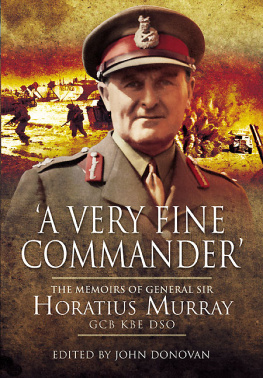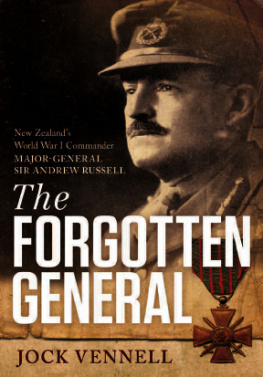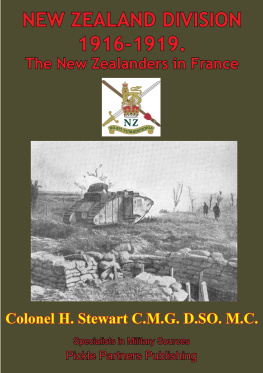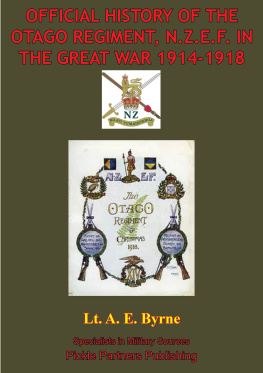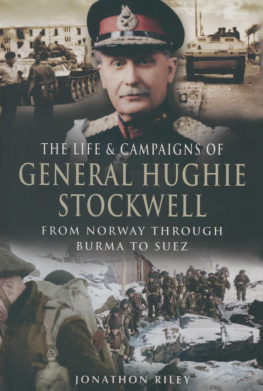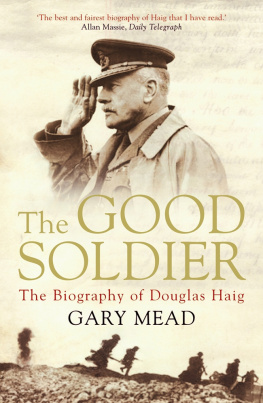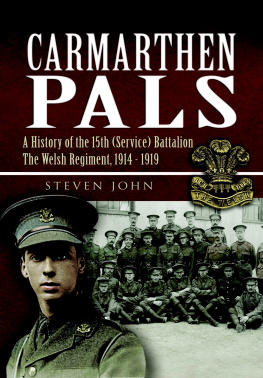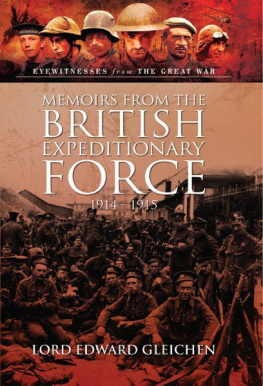Haigs Tower of Strength
Haigs Tower of Strength
General Sir Edward Bulfin Irelands Forgotten General
John Powell
Foreword by
General the Lord Dannatt GCB, CBE, MC, DL
First published in Great Britain in 2018
by Pen & Sword Military
An imprint of Pen & Sword Books Limited
47 Church Street
Barnsley
South Yorkshire
S70 2AS
Copyright John Powell 2018
ISBN 978 1 52672 260 7
eISBN 978 1 52672 261 4
Mobi ISBN 978 1 52672 262 1
The right of John Powell to be identified as Author of this Work has been asserted by him in accordance with the Copyright, Designs and Patents Act 1988.
A CIP catalogue record for this book is available from the British Library.
All rights reserved. No part of this book may be reproduced or transmitted in any form or by any means, electronic or mechanical including photocopying, recording or by any information storage and retrieval system, without permission from the Publisher in writing.
Pen & Sword Books Limited incorporates the imprints of Atlas, Archaeology, Aviation, Discovery, Family History, Fiction, History, Maritime, Military, Military Classics, Politics, Select, Transport, True Crime, Air World, Frontline Publishing, Leo Cooper, Remember When, Seaforth Publishing, The Praetorian Press, Wharncliffe Local History, Wharncliffe Transport, Wharncliffe True Crime and White Owl.
For a complete list of Pen & Sword titles please contact
PEN & SWORD BOOKS LIMITED
47 Church Street, Barnsley, South Yorkshire, S70 2AS, England
E-mail:
Website: www.pen-and-sword.co.uk
Maps
South Africa 18991902
Modder River
France and Belgium 1914
The Ypres Salient 19141915
Loos 1915
Hohenzollern Redoubt and Fosse 8
Arras/Vimy Ridge, JulyOctober 1916
Macedonian Front 19161917
Palestine 19171918
Egypt 1919
Glossary
| AA&QMG | Assistant Adjutant & Quartermaster General |
| ADC | Aide-de-Camp |
| AG | Adjutant General |
| ANZAC | Australian and New Zealand Army Corps |
| BEF | British Expeditionary Force |
| BGGS | Brigadier General, General Staff |
| BL | British Library |
| CB | Companion of the Order of the Bath |
| CGS | Chief of General Staff |
| CIGS | Chief of the Imperial General Staff |
| C-in-C | Commander-in-Chief |
| CO | Commanding Officer |
| COS | Chief-of-Staff |
| CRA | Commander Royal Artillery |
| CRE | Commander Royal Engineers |
| DAAG | Deputy Assistant Adjutant General |
| DSO | Distinguished Service Order |
| EEF | Egyptian Expeditionary Force |
| GHG | Green Howards Gazette |
| GHQ | General Headquarters |
| GOC | General Officer Commanding |
| GSO1 | General Staff Officer Grade 1 |
| GSO2 | General Staff Officer Grade 2 |
| IRA | Irish Republican Army |
| IWM | Imperial War Museum |
| KCB | Knight Commander of the Bath |
| KOSB | Kings Own Scottish Borderers |
| KOYLI | Kings Own Yorkshire Light Infantry |
| KRRC | Kings Royal Rifle Corps |
| LHCMA | Liddell Hart Centre for Military Archives |
| MC | Military Cross |
| MGGS | Major General, General Staff |
| MGRA | Major General, Royal Artillery |
| NAM | National Army Museum |
| NCO | Non-Commissioned Officer |
| ODNB | Oxford Dictionary of National Biography |
| OH | Official History |
| QMG | Quartermaster General |
| RA | Royal Artillery |
| RE | Royal Engineers |
| RIC | Royal Irish Constabulary |
| RSM | Regimental Sergeant Major |
| RWF | Royal Welch Fusiliers |
| TA | Territorial Army |
| TCD | Trinity College Dublin |
| TF | Territorial Force |
| TNA | The National Archives, Kew |
| VC | Victoria Cross |
| Y&L | York & Lancaster Regiment |
Foreword
Bookshelves are well supplied with volumes about the great and the good and their remarkable achievements. But it is rare to find a biography of one of those characters in history who might have been missed in the thick of the scrum or in the crush of life. John Powell has brought forward one such man, who demands our attention Edward Bulfin. Not a household name liked Haig or Allenby, but General Sir Edward Bulfin was a distinguished soldier in his own right, and without his herculean efforts both Haig and Allenby might well have been consigned to the footnotes of history. Both generals recognised Bulfins contribution to their success Haig described him as his Tower of Strength, and Allenby acknowledged that he would never have succeeded in his great battles in Palestine without him. Here is a man who deserves our attention, and in this superbly researched biography, John Powell an accomplished soldier and military historian himself explains why this is so.
As this book recounts, Edward Bulfin stood out from the ranks of many early twentieth century soldiers for a variety of reasons. He was the most senior Irish Catholic soldier to serve in the British Army during and after the First World War. He was fiercely Irish and British, never forgetting the land of his birth but equally never forgetting under whose authority he served that of God and King. His refusal, late in his career, to accept command of all police forces in Ireland as tension between Nationalists and Unionists mounted, demonstrated his priorities to serve his God-given conscience first, and his King second. But ultimately, his heart lay with people the people of his native Ireland, the people in uniform who were the soldiers under his command, and especially those in his beloved regiment, The Green Howards. Moreover, he was a family man, delighted to have his son, Eddie, serve as his ADC for many years and then desolate when that son predeceased him, not through enemy action but after a tragic illness.
Success on the battlefield, however, rarely comes about through chance. Napoleon Bonaparte might have admired lucky generals, but for Edward Bulfin the hard grind of experience battles fought, lessons learnt and wisdom derived substituted for attendance at Sandhurst or Woolwich, or even at the Army Staff College. Bulfin was a graduate of the battle at Modder River in the Boer War, the retreat to the Marne in 1914 in steadfast command of 2nd Brigade, his crucial contribution to saving Ypres and a desperate pounding at Loos in 1915 in command of 28th Division at the hands of both the Germans and Hubert Gough, his own Corps Commander. Moreover, there was a period of reflection and dedication in his training of the superb 60th (London) Division in 1916 and his subsequent command of that division in France and Salonika all these experiences resulting in Bulfin becoming the outstanding commander of XXI Corps in Palestine, when Allenby needed him most, to complete the defeat of the Turks. And then, as now, a soldier needs not just to be courageous and committed but worldly-wise too. Bulfins early appointment as ADC to the Commander-in-Chief and sometime acting High Commissioner in South Africa had shown him that politics and soldiering are indivisible. This realization paid huge dividends when dealing with civil unrest in Egypt in 1919 and bred the caution that led him to refuse the overall police command role in Ireland in 1920 the latter event, perhaps, coloured by the knowledge that it was his cousins son who had raised the flag of Irish Nationalism on the roof of the GPO building in Dublin, on Easter Day 1916.




